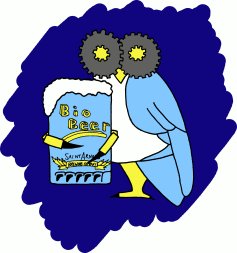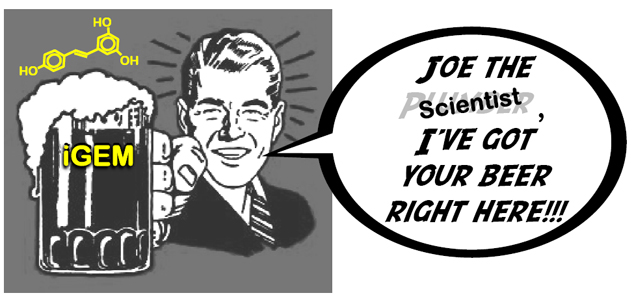Team:Rice University
From 2008.igem.org
(→BioBeer: Producing Resveratrol During Fermentation in Beer) |
|||
| Line 15: | Line 15: | ||
== '''BioBeer: Producing Resveratrol During Fermentation in Beer''' == | == '''BioBeer: Producing Resveratrol During Fermentation in Beer''' == | ||
[[Image:iGEM-2008-Splash.jpg|400px|right]] | [[Image:iGEM-2008-Splash.jpg|400px|right]] | ||
| - | + | Resveratrol <BR> | |
| - | + | -First identified as the active component in C. quinquangulata (cinnamon) extract responsible for anti-inflammatory properties. <BR> | |
| + | -Normally used as a defense mechanism in plants in response to fungal pathogens and UV irradiation. <BR> | ||
| + | -Main source in human diet is red wine, but significant amounts are also found in grape juice, peanuts, cranberry juice, and others. | ||
| + | [[Image:trans-resveratrol.jpg|400px|left]] | ||
<BR><BR><BR><BR><BR><BR><BR><BR><BR><BR> | <BR><BR><BR><BR><BR><BR><BR><BR><BR><BR> | ||
Revision as of 20:53, 25 October 2008
Welcome to Rice University's 2008 iGEM wiki page.
Our project for this year is BIOBEER, where we are genetically engineering the biosynthetic pathway for resveratrol production into a brewing yeast strain. Resveratrol has been shown to have a plethora of health benefits, including anti-cancer and anti-viral activity, cardio- and neuro-protective effects, modulation of diabetes, and anti-aging effects. Although research has been done previously to produce resveratrol in various organisms, no one to date has developed a yeast strain able to synthesize resveratrol in a de novo manner. We are going one step further, characterizing resveratrol production during anaerobic fermentation with the intent of creating a beer that contains all the health benefits of wine. Get ready for resveratrol in a fizzy ready-to-consume beverage!
(More detailed descriptions of projects to be added.)
BioBeer: Producing Resveratrol During Fermentation in Beer
Resveratrol
-First identified as the active component in C. quinquangulata (cinnamon) extract responsible for anti-inflammatory properties.
-Normally used as a defense mechanism in plants in response to fungal pathogens and UV irradiation.
-Main source in human diet is red wine, but significant amounts are also found in grape juice, peanuts, cranberry juice, and others.
| Home | The Team | The Project | Parts Submitted to the Registry | Notebook |
|---|
 "
"




